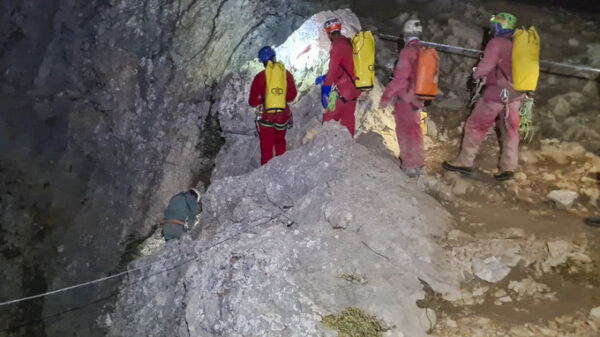In this image from video, Bill Gates speaks during the White House Climate Leaders Summit, Friday, April 23, 2021. The White House is bringing out the billionaires, the CEOs and the union executives Friday to help sell President Joe Biden’s climate-friendly transformation of the U.S. economy at his virtual summit of world leaders. (AP Photo)
WASHINGTON (AP) — The White House brought out the billionaires, the CEOs and the union executives Friday to help sell President Joe Biden’s vision of a climate-friendly transformation of the U.S. economy at his virtual summit of world leaders.
The closing day of the two-day summit on climate change showcased Bill Gates and Mike Bloomberg, steelworker and electrical union leaders and executives for solar and other renewable energy, all arguing that pouring money now into emerging technology and efficient transport and electric systems will pay off in jobs and wealth long-term.
Presidents and prime ministers from around the world joined in to describe their own investments and commitments to break away from reliance on climate-damaging petroleum and coal.
Prime Minister Benjamin Netanyahu, speaking virtually like the dozens of other participating international officials, described scientists at hundreds of Israeli start-ups working hard to improve crucial battery storage for solar, wind and other renewable energy.
President Uhuru Muigai Kenyatta described Kenya leapfrogging its economy from coal, kerosene and wood fires to a leading user and producer of geothermal and wind.
Prime Minister Mette Frederiksen renewed Denmark’s pledge to end oil and gas exploration in the North Sea, switching from offshore oil and gas rigs to wind farms.
Bloomberg spoke from the U.S., declaring, “We can’t beat climate change without a historic amount of new investment.”
“We have to do more, faster to cut emissions,” said Bloomberg, who’s donated millions to promote replacing dirty-burning coal-fired power plants with increasingly cheaper renewable energy.
Biden envoy John Kerry stressed the political selling point that the president’s call for retrofitting creaky U.S. infrastructure to run more cleanly would put the U.S. on a better economic footing long-term. “No one is being asked for a sacrifice,” Kerry said. “This is an opportunity.”
It’s all in service of an argument U.S. officials say will make or break Biden’s climate agenda: Pouring trillions of dollars into clean-energy technology, research and infrastructure will speed a competitive U.S. economy into the future and create jobs, while saving the planet.
Republicans are sticking to the arguments that former President Donald Trump made in pulling the U.S. out of the 2015 Paris climate accord. They point to China as the world’s worst climate polluter — the U.S. is No. 2 — and say any transition to clean energy hurts American oil, natural gas and coal workers.
It means “putting good-paying American jobs into the shredder,” Senate Minority Leader Mitch McConnell, R-Ky., said on the Senate floor Thursday in a speech in which he dismissed the administration’s plans as costly and ineffective.
“This is quite the one-two punch,” McConnell said. “Toothless requests of our foreign adversaries … and maximum pain for American citizens.”
Much of the proposed spending to address climate change is included in Biden’s $2.3 trillion infrastructure bill, which would pay for new roads, safe bridges and reliable public transit, while boosting electric vehicles, clean drinking water and investments in clean energy such as solar and wind power.
Biden’s plan faces a steep road in the closely divided Senate, where Republicans led by McConnell have objected.
The White House says administration officials will continue to reach out to Republicans and will remind them that the proposal’s ideas are already widely popular with Americans of all political persuasions.
The urgency comes as scientists say that climate change caused by coal plants, car engines and other fossil fuel use is worsening droughts, floods, hurricanes, wildfires and other disasters and that humans are running out of time to stave off catastrophic extremes of global warming.
The event has featured the world’s major powers — and major polluters — pledging to cooperate on cutting petroleum and coal emissions that are rapidly warming the planet.
In an announcement timed to his summit, Biden pledged the U.S. will cut fossil fuel emissions as much as 52% by 2030.
Allies joined the U.S. in announcing new moves to cut emissions. That’s ahead of November’s U.N. climate summit in Glasgow, where governments will say how far each is willing to go to cut the amount of fossil fuel fumes it pumps out.
Japan announced its own new 46% emissions reduction target, and South Korea said it would stop public financing of new coal-fired power plants, potentially an important step toward persuading China and other coal-reliant nations to curb the building and funding of new ones as well. Canadian Prime Minister Justin Trudeau said his nation would boost its fossil fuel pollution cuts from 30% to at least 40%.
Biden was scheduled to address the summit Friday at a session on the “economic opportunities of climate action.”
Biden’s new goal to cut greenhouse gas emissions by 50% to 52% from 2005 levels, announced Thursday at the summit, puts the United States among the four most ambitious nations in curbing climate change, the Rhodium Group, an independent research organization, announced overnight.
Different nations use different base years for their emission cuts so comparisons are difficult and can look different based on baseline years. The Rhodium Group said using the U.S.-preferred 2005 baseline, America is in the top four, behind the United Kingdom but right with the European Union. It’s ahead of a “second tier” of countries that include Canada, Japan, Iceland and Norway.
The Biden administration’s pledge would require by far the most ambitious U.S. climate effort ever, nearly doubling the reductions that the Obama administration had committed to in the Paris climate accord.
Seth Borenstein contributed from Washington. Knickmeyer reported from Oklahoma City.
Copyright 2020 Associated Press. All rights reserved.





























